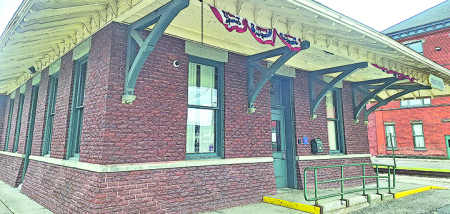A Fortunate Experience: Sherburne WWII Vet Re-visits And Remembers Site Of Captivity
Published:
March 9th, 2007
By:
Michael McGuire
SHERBURNE – Hoyt Adsit says he’s fortunate. He’s fortunate to have his family and his health, and he’s fortunate for his memories.
In September, Adsit and his wife Nancy traveled to Romania where during World War II he and six others spent 92 days as prisoners of war. He said he went back to say, “Thank you.”
“We were very fortunate,” Adsit said, referring to his time spent in captivity. “It was nothing compared to the poor guys being held by the Japanese.”
He remembers almost every detail of June 6, 1944 – the morning of the D-Day Invasion – the day he was taken prisoner. His unit was up at 3 a.m. and by dawn had taken-off from the air base at Pentella, Italy. Like the other 15 missions Adsit had spent as an engineer gunner in the 15th Air Force, he expected trouble, but he also expected to return safely.
“That’s what you expected,” he said. “You don’t expect them to just watch you come over.”
Just after completing the mission – bombing a strategic oil field in Polesti, Romania, a heavily defended supply source for the German forces – Adsit’s B-17 bomber was hit by ground fire and had to be abandoned. Four members of the unit parachuted to safer ground on the Yugoslavian side of the Danube River, while the other seven, including Adsit, landed in enemy territory in Romania. They were quickly rounded-up by Romanian soldiers and taken to Bucharest, the capital.
“They kept us in county jails by day and on a horse and buggy by night,” Adsit said, explaining it took four days to reach the POW camp.
Admitting prison was no walk in the park, Adsit acknowledged that the captives had a good relationship with their guards. He added that experiences before the war, like living through the Great Depression, prepared them for the hardships.
“You weren’t gaining weight,” he said. “But you weren’t starving to death, either. We were lucky.”
Allied bombings of Bucharest were the scariest part of the experience, said Adsit.
“Everybody was scared as hell when the plaster was shaking off the walls,” he recalled. “You heard guys praying, that’s for sure. I don’t think there is anybody that’s an atheist at that point.”
When asked what was more challenging, prison or a bombing mission, Adsit took several seconds, replying, “Prison.”
“It was always the unknown,” he said. “On a mission – if everything went all right – you knew you’d eventually be back on the base.”
Three months after Adsit’s unit entered the camp, Romania turned against the Nazis, and the Russian army invaded Bucharest and opened the prison gates. With nowhere to go, he explained that in a twist of fate his unit, along with other American prisoners, fled to the outskirts of the city and stayed with Romanian soldiers, his former captors. Lacking Russian support and fearing German retaliation, Adsit said it was “a screwed up mess,” that actually placed the former prisoners and guards in the same situation. However, after several days the POWs left the woods as American planes flew into Bucharest to rescue them. After spending 94 days away, Adsit was back in Pentella, and eventually he came home to the Sherburne/North Norwich area, where he was born and raised.
In September 2006, after scheduling a meeting with the Romanian Government, Adsit returned there and thanked Princess Brianna Caradja, the granddaughter of Princess Katherine, a deceased member of the Romanian Royal Family. According to Adsit, Katherine supposedly helped convince German occupiers not to take the American POW’s from Bucharest to Germany just prior to the Russia take-over. Adsit believes he would never have came home had she not intervened.
“Meeting with her (Caradja) and thanking her grandmother was the highlight,” he said. “There was no animosity, war is war ... We were very fortunate.”
Oddly enough, Adsit said Caradja’s husband, a banker, is originally from Oriskany Falls in Oneida County.
Author: Michael McGuire - More From This Author
Comments










